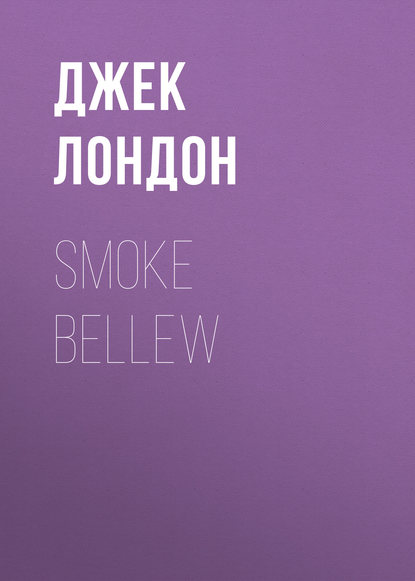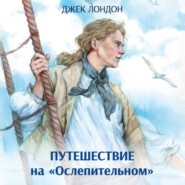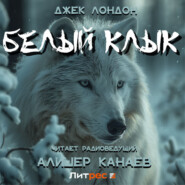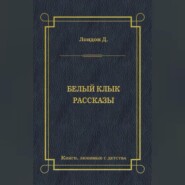По всем вопросам обращайтесь на: info@litportal.ru
(©) 2003-2024.
✖
Smoke Bellew
Настройки чтения
Размер шрифта
Высота строк
Поля
“It is not of my senses,” Smoke diagnosed. “I sense something, from without, that is tingling me with ice; it is a chill of my nerves.”
A quarter of an hour later they paused for breath.
“I can no longer see the far peaks,” Smoke said.
“The air is getting thick and heavy,” said Labiskwee. “It is hard to breathe.”
“There be three suns,” McCan muttered hoarsely, reeling as he clung to his staff for support.
There was a mock sun on either side of the real sun.
“There are five,” said Labiskwee; and as they looked, new suns formed and flashed before their eyes.
“By Heaven, the sky is filled with suns beyant all countin’,” McCan cried in fear.
Which was true, for look where they would, half the circle of the sky dazzled and blazed with new suns forming.
McCan yelped sharply with surprise and pain. “I’m stung!” he cried out, then yelped again.
Then Labiskwee cried out, and Smoke felt a prickling stab on his cheek so cold that it burned like acid. It reminded him of swimming in the salt sea and being stung by the poisonous filaments of Portuguese men-of-war. The sensations were so similar that he automatically brushed his cheek to rid it of the stinging substance that was not there.
And then a shot rang out, strangely muffled. Down the slope were the young men, standing on their skees, and one after another opened fire.
“Spread out!” Smoke commanded. “And climb for it! We’re almost to the top. They’re a quarter of a mile below, and that means a couple of miles the start of them on the down-going of the other side.”
With faces prickling and stinging from invisible atmospheric stabs, the three scattered widely on the snow surface and toiled upward. The muffled reports of the rifles were weird to their ears.
“Thank the Lord,” Smoke panted to Labiskwee, “that four of them are muskets, and only one a Winchester. Besides, all these suns spoil their aim. They are fooled. They haven’t come within a hundred feet of us.”
“It shows my father’s temper,” she said. “They have orders to kill.”
“How strange you talk,” Smoke said. “Your voice sounds far away.”
“Cover your mouth,” Labiskwee cried suddenly. “And do not talk. I know what it is. Cover your mouth with your sleeve, thus, and do not talk.”
McCan fell first, and struggled wearily to his feet. And after that all fell repeatedly ere they reached the summit. Their wills exceeded their muscles, they knew not why, save that their bodies were oppressed by a numbness and heaviness of movement. From the crest, looking back, they saw the young men stumbling and falling on the upward climb.
“They will never get here,” Labiskwee said. “It is the white death. I know it, though I have never seen it. I have heard the old men talk. Soon will come a mist – unlike any mist or fog or frost-smoke you ever saw. Few have seen it and lived.”
McCan gasped and strangled.
“Keep your mouth covered,” Smoke commanded.
A pervasive flashing of light from all about them drew Smoke’s eyes upward to the many suns. They were shimmering and veiling. The air was filled with microscopic fire-glints. The near peaks were being blotted out by the weird mist; the young men, resolutely struggling nearer, were being engulfed in it. McCan had sunk down, squatting, on his skees, his mouth and eyes covered by his arms.
“Come on, make a start,” Smoke ordered.
“I can’t move,” McCan moaned.
His doubled body set up a swaying motion. Smoke went toward him slowly, scarcely able to will movement through the lethargy that weighed his flesh. He noted that his brain was clear. It was only the body that was afflicted.
“Let him be,” Labiskwee muttered harshly.
But Smoke persisted, dragging the Irishman to his feet and facing him down the long slope they must go. Then he started him with a shove, and McCan, braking and steering with his staff, shot into the sheen of diamond-dust and disappeared.
Smoke looked at Labiskwee, who smiled, though it was all she could do to keep from sinking down. He nodded for her to push off, but she came near to him, and side by side, a dozen feet apart, they flew down through the stinging thickness of cold fire.
Brake as he would, Smoke’s heavier body carried him past her, and he dashed on alone, a long way, at tremendous speed that did not slacken till he came out on a level, crusted plateau. Here he braked till Labiskwee overtook him, and they went on, again side by side, with diminishing speed which finally ceased. The lethargy had grown more pronounced. The wildest effort of will could move them no more than at a snail’s pace. They passed McCan, again crouched down on his skees, and Smoke roused him with his staff in passing.
“Now we must stop,” Labiskwee whispered painfully, “or we will die. We must cover up – so the old men said.”
She did not delay to untie knots, but began cutting her pack-lashings. Smoke cut his, and, with a last look at the fiery death-mist and the mockery of suns, they covered themselves over with the sleeping-furs and crouched in each other’s arms. They felt a body stumble over them and fall, then heard feeble whimpering and blaspheming drowned in a violent coughing fit, and knew it was McCan who huddled against them as he wrapped his robe about him.
Their own lung-strangling began, and they were racked and torn by a dry cough, spasmodic and uncontrollable. Smoke noted his temperature rising in a fever, and Labiskwee suffered similarly. Hour after hour the coughing spells increased in frequency and violence, and not till late afternoon was the worst reached. After that the mend came slowly, and between spells they dozed in exhaustion.
McCan, however, steadily coughed worse, and from his groans and howls they knew he was in delirium. Once, Smoke made as if to throw the robes back, but Labiskwee clung to him tightly.
“No,” she begged. “It is death to uncover now. Bury your face here, against my parka, and breathe gently and do no talking – see, the way I am doing.”
They dozed on through the darkness, though the decreasing fits of coughing of one invariably aroused the other. It was after midnight, Smoke judged, when McCan coughed his last. After that he emitted low and bestial moanings that never ceased.
Smoke awoke with lips touching his lips. He lay partly in Labiskwee’s arms, his head pillowed on her breast. Her voice was cheerful and usual. The muffled sound of it had vanished.
“It is day,” she said, lifting the edge of the robes a trifle. “See, O my lover. It is day; we have lived through; and we no longer cough. Let us look at the world, though I could stay here thus forever and always. This last hour has been sweet. I have been awake, and I have been loving you.”
“I do not hear McCan,” Smoke said. “And what has become of the young men that they have not found us?”
He threw back the robes and saw a normal and solitary sun in the sky. A gentle breeze was blowing, crisp with frost and hinting of warmer days to come. All the world was natural again. McCan lay on his back, his unwashed face, swarthy from camp-smoke, frozen hard as marble. The sight did not affect Labiskwee.
“Look!” she cried. “A snow bird! It is a good sign.”
There was no evidence of the young men. Either they had died on the other side of the divide or they had turned back.
There was so little food that they dared not eat a tithe of what they needed, nor a hundredth part of what they desired, and in the days that followed, wandering through the lone mountain-land, the sharp sting of life grew blunted and the wandering merged half into a dream. Smoke would become abruptly conscious, to find himself staring at the never-ending hated snow-peaks, his senseless babble still ringing in his ears. And the next he would know, after seeming centuries, was that again he was roused to the sound of his own maunderings. Labiskwee, too, was light-headed most of the time. In the main their efforts were unreasoned, automatic. And ever they worked toward the west, and ever they were baffled and thrust north or south by snow-peaks and impassable ranges.
“There is no way south,” Labiskwee said. “The old men know. West, only west, is the way.”
The young men no longer pursued, but famine crowded on the trail.
Came a day when it turned cold, and a thick snow, that was not snow but frost crystals of the size of grains of sand, began to fall. All day and night it fell, and for three days and nights it continued to fall. It was impossible to travel until it crusted under the spring sun, so they lay in their furs and rested, and ate less because they rested. So small was the ration they permitted that it gave no appeasement to the hunger pang that was much of the stomach, but more of the brain. And Labiskwee, delirious, maddened by the taste of her tiny portion, sobbing and mumbling, yelping sharp little animal cries of joy, fell upon the next day’s portion and crammed it into her mouth.
Then it was given to Smoke to see a wonderful thing. The food between her teeth roused her to consciousness. She spat it out, and with a great anger struck herself with her clenched fist on the offending mouth.
It was given to Smoke to see many wonderful things in the days yet to come. After the long snow-fall came on a great wind that drove the dry and tiny frost-particles as sand is driven in a sand-storm. All through the night the sand-frost drove by, and in the full light of a clear and wind-blown day, Smoke looked with swimming eyes and reeling brain upon what he took to be the vision of a dream. All about towered great peaks and small, lone sentinels and groups and councils of mighty Titans. And from the tip of every peak, swaying, undulating, flaring out broadly against the azure sky, streamed gigantic snow-banners, miles in length, milky and nebulous, ever waving lights and shadows and flashing silver from the sun.
“Mine eyes have seen the glory of the coming of the Lord,” Smoke chanted, as he gazed upon these dusts of snow wind-driven into sky-scarves of shimmering silken light.
And still he gazed, and still the bannered peaks did not vanish, and still he considered that he dreamed, until Labiskwee sat up among the furs.

















